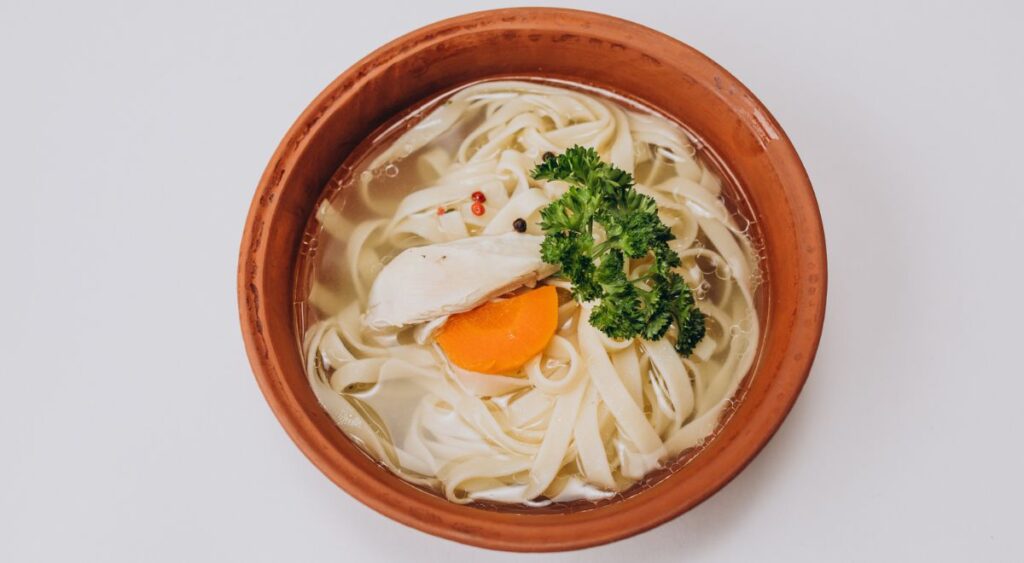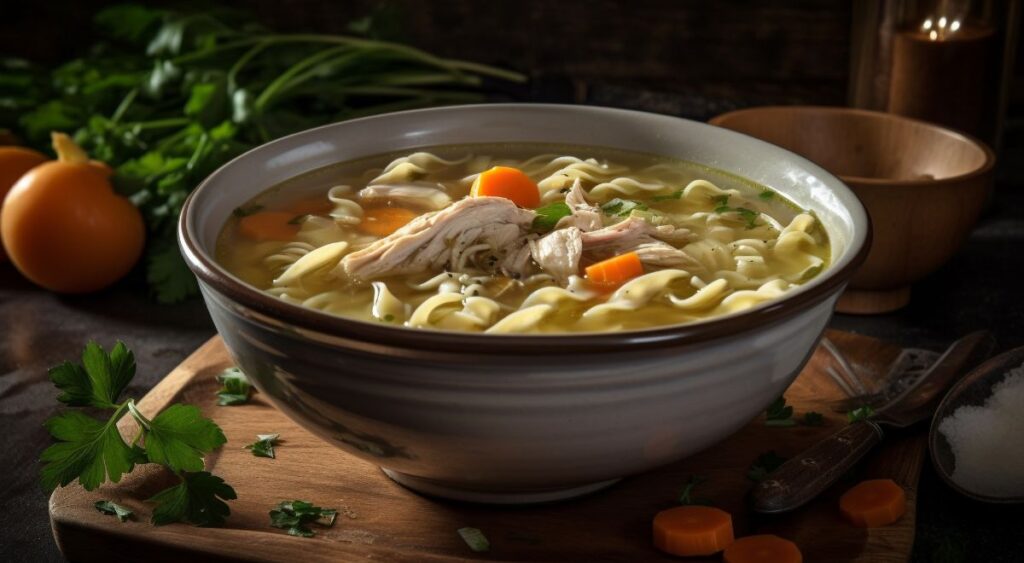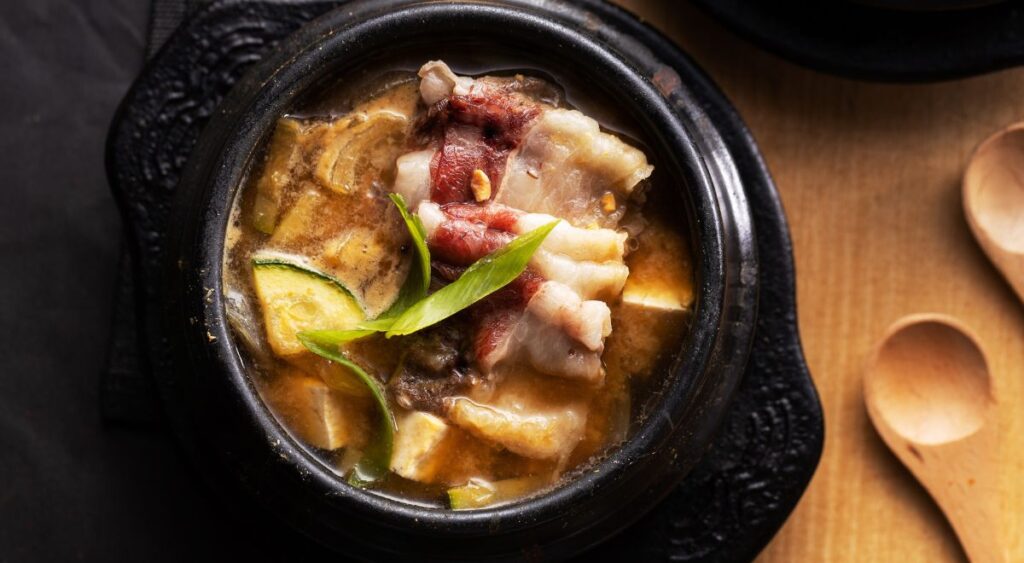1. Introduction of Is Wonton Soup Good For Weight Loss
Wonton soup, a traditional Chinese dish consisting of dumplings filled with meat or vegetables served in a savory broth, has gained popularity worldwide for its delicious taste and comforting qualities. However, beyond its culinary appeal, many individuals wonder whether incorporating wonton soup into their diet can support their weight loss goals.

Exploring the Relationship Between Wonton Soup and Weight Loss:
To understand the potential impact of wonton soup on weight loss, it’s essential to examine its nutritional composition and how it fits into a balanced diet. While wonton soup can be a flavorful addition to your meals, its calorie and nutrient content can vary significantly depending on factors such as the type of broth used, the ingredients in the filling, and portion size.
Understanding the Nutritional Components:
Wonton soup typically consists of three main components: the broth, the wonton wrappers, and the filling. The broth, often made from chicken, pork, or vegetable stock, provides a flavorful base and contributes to the soup’s overall volume. Wonton wrappers, made from flour and water, add carbohydrates to the dish, while the filling, which can contain meat, seafood, tofu, or vegetables, contributes protein, vitamins, and minerals.
While wonton soup can be nutritious, it’s important to note that its calorie and sodium content can vary widely depending on how it’s prepared. Store-bought or restaurant versions of wonton soup may contain higher levels of sodium and fat, while homemade versions allow for greater control over ingredients and portion sizes.
In the following sections, we’ll delve deeper into the nutritional profile of wonton soup, explore its potential benefits for weight loss, and provide practical tips for incorporating this flavorful dish into a healthy eating plan. Whether you’re seeking to shed a few pounds or simply enjoy the comforting taste of wonton soup, understanding its role in your diet is key to making informed choices about your health and wellness.
2. Nutritional Profile and Health Benefits
Wonton soup offers a diverse array of nutrients that can contribute to overall health and potentially support weight loss efforts. Understanding its nutritional profile and health benefits can help individuals make informed decisions about including this dish in their diet.
Overview of Nutritional Content:
Wonton soup’s nutritional content can vary depending on factors such as the type of broth, filling ingredients, and portion size. However, as a general guideline, a typical serving of wonton soup (one cup) may contain approximately:
- Calories: 100-200 calories
- Protein: 5-10 grams
- Carbohydrates: 15-25 grams
- Fat: 2-5 grams
- Fiber: 1-3 grams
- Sodium: 500-1000 milligrams
The exact nutritional values can vary based on the specific recipe and preparation method. For example, homemade wonton soup may contain fewer calories and sodium compared to commercially prepared or restaurant versions.
Health Benefits of Wonton Soup Ingredients:

Protein:
The protein content in wonton soup primarily comes from the filling, which often includes lean sources such as chicken, shrimp, or tofu. Protein is essential for muscle repair and growth, and it also helps to keep you feeling full and satisfied, which can aid in weight management by reducing overall calorie intake.
While wonton wrappers contribute to the carbohydrate content of the soup, they also provide energy to fuel daily activities. Opting for whole wheat or low-carb wonton wrappers can increase the fiber content and slow down digestion, promoting satiety and preventing spikes in blood sugar levels.
Vitamins and Minerals:
Carbohydrates:
Wonton soup’s filling ingredients, such as vegetables and lean proteins, offer a wide range of vitamins and minerals essential for overall health. These include vitamin A, vitamin C, iron, calcium, and potassium, among others. Consuming a variety of nutrient-rich foods supports optimal bodily functions and can contribute to weight loss by promoting overall wellness.
Low-Calorie Option:
Compared to other high-calorie, high-fat dishes, wonton soup can be a relatively low-calorie option, especially when prepared with a clear broth and lean protein fillings. Choosing broth-based soups like wonton soup over calorie-dense meals can help individuals manage their calorie intake and create a calorie deficit, which is essential for weight loss.
In summary, wonton soup offers a balance of nutrients that can support overall health and potentially aid in weight loss when incorporated into a well-rounded diet. By paying attention to portion sizes, choosing nutrient-dense ingredients, and preparing homemade versions whenever possible, individuals can enjoy the flavorful benefits of wonton soup while working towards their weight loss goals.
3. How Wonton Soup Supports Weight Loss
Wonton soup can be a valuable addition to a weight loss plan when consumed mindfully and as part of a balanced diet. Here, we’ll explore how the components of wonton soup, such as its protein content, carbohydrates, and other nutrients, can support weight loss efforts.

Protein Content and Its Role in Weight Management:
Protein is an essential macronutrient that plays a crucial role in supporting weight loss. It helps to increase feelings of fullness and satiety, which can prevent overeating and reduce overall calorie intake. Wonton soup’s protein content primarily comes from the filling, which often includes lean sources such as chicken, shrimp, or tofu. By incorporating protein-rich ingredients into the soup, individuals can promote muscle repair and growth while supporting their weight loss goals.
Impact of Carbohydrates on Weight Loss Goals:
Carbohydrates, including those found in wonton wrappers and vegetables, provide energy for daily activities. While it’s essential to monitor carbohydrate intake, especially for individuals following low-carb or ketogenic diets, choosing whole wheat or low-carb wonton wrappers can help regulate blood sugar levels and prevent spikes in insulin, which can promote fat storage. Including fiber-rich vegetables in the soup can also increase satiety and support digestive health, contributing to weight loss efforts.
Other Nutrients and Their Contribution to Weight Loss:
Wonton soup contains a variety of vitamins, minerals, and antioxidants that can support overall health and potentially aid in weight loss. For example, vegetables like spinach, bok choy, and carrots are rich in vitamins A and C, which play essential roles in immune function and cell regeneration. Additionally, the broth in wonton soup may contain herbs and spices with anti-inflammatory properties, such as ginger and garlic, which can support a healthy metabolism and digestion.
Tips for Incorporating Wonton Soup into a Weight Loss Plan:
Mindful Portion Control:
Be mindful of portion sizes when enjoying wonton soup to avoid overeating. Stick to one serving size and pair the soup with a side salad or steamed vegetables for a balanced meal.
Choose Lean Protein Fillings:
Opt for lean protein fillings like chicken, shrimp, or tofu to keep the calorie and fat content of the soup in check. Avoid fried or high-fat fillings, which can add unnecessary calories.
Homemade Preparation:
Whenever possible, prepare wonton soup at home using fresh, wholesome ingredients. This allows you to control the sodium, fat, and calorie content of the soup and customize it to suit your dietary preferences.
By incorporating wonton soup into a balanced diet and following these tips, individuals can enjoy its delicious flavor while supporting their weight loss goals. Remember to focus on overall dietary patterns and lifestyle habits for long-term success in achieving and maintaining a healthy weight.
4. Tips for Incorporating Wonton Soup into a Weight Loss Plan
Incorporating wonton soup into a weight loss plan requires mindful choices and strategies to ensure it aligns with your goals. Here are some practical tips to help you enjoy wonton soup while supporting your weight loss journey:
1. Mindful Portion Control:
- Pay attention to portion sizes and aim to consume a single serving of wonton soup per meal. Avoid going back for seconds to prevent overeating.
- Use smaller bowls or soup cups to help control portion sizes and prevent the temptation to overindulge.
2. Choose Lean Protein Fillings:
- Opt for wonton soup varieties with lean protein fillings such as chicken, shrimp, or tofu. These options provide satisfying protein without excessive calories or fat.
- Avoid wonton soups with high-fat or fried fillings, as they can significantly increase the calorie content of the dish.
3. Load Up on Vegetables:
- Enhance the nutritional value of wonton soup by adding plenty of vegetables such as spinach, bok choy, carrots, and mushrooms.
- Vegetables add fiber, vitamins, and minerals to the soup, increasing its satiety factor and helping you feel fuller for longer.
4. Opt for Clear Broth:
- Choose wonton soups with clear broth instead of creamy or high-fat options. Clear broths tend to be lower in calories and fat while still providing plenty of flavor.
- Clear broths also allow the other ingredients, such as protein and vegetables, to shine without adding unnecessary calories.
5. Homemade Preparation:
- Whenever possible, prepare wonton soup at home using fresh, wholesome ingredients. Homemade soups allow you to control the quality and quantity of ingredients, including sodium and fat levels.
- Experiment with different recipes and ingredient combinations to create a customized wonton soup that meets your taste preferences and dietary needs.
6. Balance Your Meal:
- Pair wonton soup with a side salad or steamed vegetables to create a balanced meal that includes a variety of nutrients.
- Incorporate whole grains such as brown rice or quinoa into your meal to add complex carbohydrates and increase the overall fiber content.
7. Practice Mindful Eating:
- Slow down and savor each bite of wonton soup, paying attention to its flavors, textures, and aromas.
- Listen to your body’s hunger and fullness cues, stopping when you feel satisfied rather than overly full.
By following these tips and incorporating wonton soup into your weight loss plan in a mindful and balanced way, you can enjoy this delicious dish while working towards your health and wellness goals. Remember that sustainable weight loss is achieved through long-term lifestyle changes, including mindful eating habits and regular physical activity.
5. Considerations and Risks
While wonton soup can be a flavorful and satisfying addition to a weight loss plan, it’s essential to consider certain factors and potential risks associated with its consumption. Here are some key considerations to keep in mind:
1. Sodium Content:
- One of the primary concerns with wonton soup, especially store-bought or restaurant versions, is its high sodium content. Excessive sodium intake can lead to bloating, water retention, and elevated blood pressure, which may not align with your weight loss goals.
- To mitigate the sodium content, consider making homemade wonton soup using low-sodium broth and reducing the amount of added salt. Alternatively, opt for clear broths and lean protein fillings, which tend to have lower sodium levels.
2. Store-Bought Wonton Soup:
- Store-bought wonton soup may contain additives, preservatives, and higher levels of sodium and fat compared to homemade versions. Be mindful of the nutritional labels and ingredients list when purchasing pre-packaged wonton soup.
- Consider exploring healthier store-bought options, such as those labeled low-sodium or made with natural ingredients. Alternatively, reserve store-bought wonton soup for occasional indulgences and focus on homemade preparations for regular consumption.
3. Dietary Restrictions:
- Individuals with dietary restrictions or food allergies should be cautious when consuming wonton soup, as it may contain ingredients such as wheat, soy, shellfish, or gluten.
- If you have dietary restrictions, carefully review the ingredients list and inquire about allergen information when ordering or preparing wonton soup. Consider making modifications or substitutions to accommodate your specific dietary needs.
4. Portion Control:
- While wonton soup can be relatively low in calories, consuming large portions or multiple servings can contribute to excess calorie intake and hinder weight loss efforts.
- Practice portion control by measuring out appropriate serving sizes and avoiding second helpings. Focus on savoring each bite and listening to your body’s hunger and fullness cues to prevent overeating.
5. Balance and Moderation:
- As with any food, moderation and balance are key when incorporating wonton soup into your weight loss plan. Enjoy wonton soup as part of a diverse and balanced diet that includes a variety of nutrient-rich foods.
- Consider rotating wonton soup with other soups, salads, lean proteins, and whole grains to ensure nutritional variety and avoid dietary monotony.
By considering these factors and being mindful of potential risks, you can enjoy wonton soup as a delicious and satisfying component of your weight loss journey. With moderation, smart choices, and awareness of your individual dietary needs, wonton soup can be a flavorful addition to your healthy eating plan.
6. Alternatives and Comparisons
In the quest for weight loss, it’s essential to explore various options and compare them to determine the most suitable choices for your dietary preferences and health goals. When considering wonton soup in the context of weight loss, it’s helpful to explore alternatives and make comparisons to make informed decisions. Here’s a closer look at some alternatives to wonton soup and how they stack up in terms of nutritional value and weight loss potential:
1. Wonton Soup vs. Other Soups:
- Compare wonton soup with other soup options, such as vegetable soup, chicken noodle soup, or minestrone soup. Evaluate factors like calorie content, protein, fiber, and sodium levels to determine which option best aligns with your weight loss goals.
- While wonton soup may offer protein-rich fillings and flavorful broth, other soups may provide a higher vegetable content and lower calorie density, making them potentially more filling and conducive to weight loss.
2. Wonton Soup vs. Broths:
- Consider how wonton soup compares to clear broths, such as chicken broth or vegetable broth, in terms of calorie content, protein, and sodium levels. Broths are typically lower in calories and fat compared to wonton soup and may be a better option for those seeking to minimize calorie intake.
- While wonton soup may offer more substantial protein and carbohydrate content, clear broths provide hydration and flavor without additional ingredients that could contribute to weight gain.
3. Homemade vs. Store-Bought Wonton Soup:
- Evaluate the nutritional differences between homemade wonton soup and store-bought varieties. Homemade versions allow for greater control over ingredients and portion sizes, potentially resulting in lower calorie and sodium content.
- Store-bought wonton soup may contain higher levels of sodium, preservatives, and additives, which could impact your weight loss efforts. Consider making homemade wonton soup whenever possible to optimize nutritional quality and minimize unwanted additives.
4. Low-Carb Alternatives:
- Explore low-carb alternatives to traditional wonton soup, such as wonton soup made with low-carb wonton wrappers or vegetable-based fillings. These options can reduce carbohydrate content and glycemic impact, making them suitable for individuals following low-carb or ketogenic diets.
- Experiment with recipes that substitute traditional ingredients with low-carb alternatives, such as zucchini noodles (zoodles) or shirataki noodles, to create a lighter, lower-calorie version of wonton soup.
5. Consider Individual Preferences and Dietary Needs:
- Ultimately, the best choice for weight loss will depend on individual preferences, dietary restrictions, and health goals. Consider factors such as taste preferences, nutritional needs, and lifestyle factors when selecting alternatives to wonton soup.
- Explore a variety of options and be open to trying new recipes and ingredients to find alternatives that satisfy your cravings while supporting your weight loss journey.
By comparing wonton soup with other alternatives and considering individual preferences and dietary needs, you can make informed choices that align with your weight loss goals. Whether you opt for traditional wonton soup, homemade variations, or alternative soup options, prioritize balance, moderation, and nutrient density to support your overall health and wellness.
7. Digestive Benefits of Wonton Soup
Digestive health plays a crucial role in overall well-being, and certain foods, including wonton soup, can have digestive benefits. In this section, we’ll explore how the ingredients in wonton soup can support digestion and provide relief from digestive discomfort.
1. Understanding the Impact on Digestion:
- Wonton soup contains a combination of ingredients, including broth, vegetables, protein, and carbohydrates, each of which can impact digestion differently.
- The warm broth in wonton soup can help stimulate digestion by promoting the secretion of digestive enzymes and facilitating the movement of food through the digestive tract.
2. Ingredients and Their Digestive Effects:
- Broth: The broth in wonton soup contains nutrients and minerals that support digestive health, such as collagen and amino acids. Collagen, in particular, is beneficial for maintaining the integrity of the digestive lining.
- Vegetables: Vegetables like bok choy, spinach, and carrots provide fiber, which promotes regular bowel movements and supports a healthy gut microbiome.
- Protein: Lean protein sources like chicken or tofu in wonton soup contribute to satiety and help stabilize blood sugar levels, which can indirectly support digestive function.
3. Tips for Easy Digestibility:
- Choose Clear Broth: Opt for wonton soup made with clear broth rather than creamy or thickened broths, which may be harder to digest, especially for individuals with sensitive digestive systems.
- Cook Vegetables Lightly: Lightly cooking vegetables in wonton soup helps break down their fiber content, making them easier to digest while retaining their nutritional value.
- Incorporate Herbs and Spices: Herbs and spices like ginger, garlic, and scallions commonly used in wonton soup have digestive-promoting properties. Ginger, in particular, can help alleviate digestive discomfort and reduce nausea.
4. Choosing the Right Noodles:
- Consider the type of noodles used in wonton soup, as certain varieties may be easier to digest than others. For example, rice noodles or egg noodles tend to be lighter and gentler on the digestive system compared to wheat-based noodles.
- Individuals with gluten sensitivities or intolerances may opt for gluten-free noodle alternatives, such as rice noodles or shirataki noodles, to minimize digestive issues.
5. Incorporating Probiotics:
- Enhance the digestive benefits of wonton soup by incorporating probiotic-rich ingredients such as miso paste or fermented tofu. Probiotics introduce beneficial bacteria into the gut, which can improve digestion and support overall gut health.
- Consider adding probiotic-rich toppings or condiments to your wonton soup, such as kimchi or sauerkraut, for an extra digestive boost.
6. Conclusion:
- Wonton soup offers a range of digestive benefits due to its nutrient-rich ingredients and digestive-promoting properties. By choosing high-quality ingredients, incorporating probiotics, and cooking with digestive-friendly methods, you can enjoy the delicious flavors of wonton soup while supporting your digestive health.
- Experiment with different ingredient combinations and cooking techniques to find the wonton soup variation that works best for your digestive needs and preferences. With its comforting warmth and nourishing qualities, wonton soup can be a soothing addition to a digestive-friendly diet.
8. Cooking and Serving Tips
Preparing and serving wonton soup can be a delightful culinary experience, and incorporating a few tips can enhance its flavor, nutritional value, and digestibility. In this section, we’ll explore various cooking and serving tips to help you create delicious and satisfying wonton soup meals.
1. Low Carb Wonton Soup Recipe:
- Consider using low-carb wonton wrappers or alternative ingredients like thinly sliced vegetables (such as zucchini or cabbage) to reduce the carbohydrate content of your wonton soup.
- Explore recipes that incorporate protein-rich fillings and nutrient-dense vegetables to create a balanced and satisfying low-carb meal.
2. Serving Suggestions:
- Serve wonton soup as a standalone dish or pair it with complementary sides such as steamed rice, stir-fried vegetables, or a side salad for a more substantial meal.
- Garnish your wonton soup with fresh herbs, such as cilantro or green onions, for added flavor and visual appeal.
3. Ways to Use Leftovers:
- Repurpose leftover wonton soup by using it as a base for other dishes, such as stir-fries or noodle bowls. Simply remove the wontons from the soup and use the broth and vegetables as a flavorful cooking liquid.
- Alternatively, freeze leftover wonton soup in individual portions for quick and convenient meals later on.
4. Homemade Preparation:
- Consider making wonton soup from scratch using fresh, wholesome ingredients. Homemade wonton soup allows you to control the quality and quantity of ingredients, including sodium and fat levels.
- Experiment with different broth bases, filling ingredients, and seasoning combinations to customize your wonton soup to your taste preferences.
5. Cooking Techniques:
- When cooking wonton soup, avoid overcooking the wontons, as they can become mushy and lose their texture. Cook the wontons just until they float to the surface, indicating they are cooked through.
- Simmer the soup gently over low to medium heat to allow the flavors to meld together without boiling excessively, which can lead to loss of nutrients and flavor.
6. Making Homemade Wonton Soup Digestible:
- Lighten up traditional wonton soup recipes by using clear broth, lean protein fillings, and plenty of vegetables. This creates a more easily digestible dish while still providing flavor and nutrition.
- Consider incorporating digestive-friendly ingredients such as ginger, garlic, and scallions into your homemade wonton soup for added digestive support.
By incorporating these cooking and serving tips into your preparation of wonton soup, you can create flavorful, nutritious, and easily digestible meals that support your health and well-being. Whether you’re enjoying wonton soup as a comforting meal on a chilly day or as part of your weight loss journey, these tips will help you make the most of this beloved dish. Experiment with different variations and techniques to find the perfect wonton soup recipe for you and your loved ones to enjoy.
Conclusion:
Wonton soup offers a myriad of benefits, from its rich flavor and comforting warmth to its potential contributions to weight loss and digestive health.
By understanding its nutritional profile, exploring alternative ingredients, and incorporating mindful cooking and serving techniques, you can enjoy wonton soup as a delicious and satisfying addition to your diet. Whether you’re seeking to shed a few pounds, support digestive wellness, or simply indulge in a flavorful meal, wonton soup provides a versatile and nourishing option.
By making informed choices and prioritizing balance, moderation, and nutrient density, you can savor the goodness of wonton soup while supporting your overall health and well-being.



Pingback: Can a Chiropractor Help With Weight Loss-Top 5 Secrets
Pingback: ICD 10 Code for Renal Cell Carcinoma: Insights
Pingback: Is grandma Pizza Healthier Than Regular Pizza